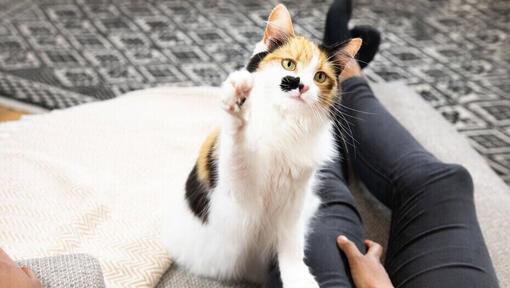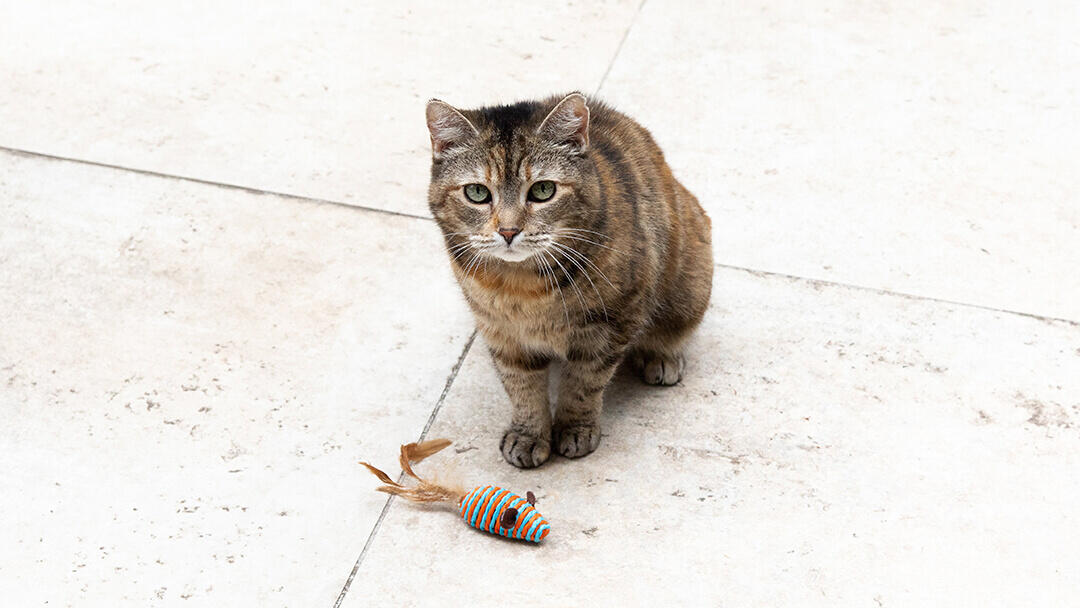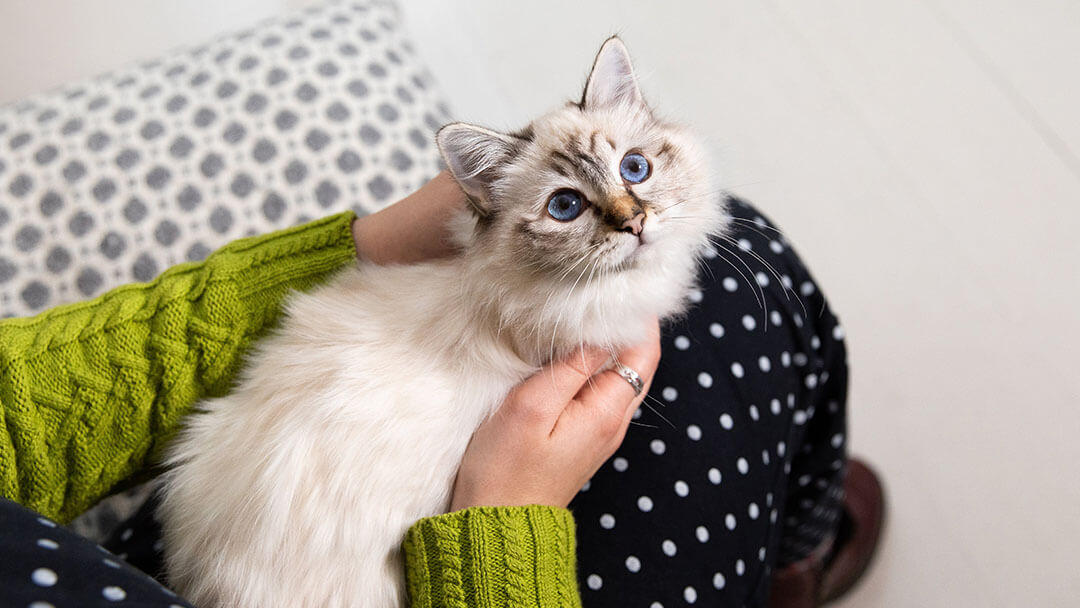
You've decided to give a cat from a shelter a forever home-a fantastic thing to do! There are so many pets in the world that have been abandoned, abused or simply had owners that were no longer able to take care of them. All these animals are looking for a second chance at a loving home.
Whether you're looking to adopt a kitten or an adult cat with a fully formed, unique personality, there are many things to consider before bringing your new family member home. Find out how to adopt a cat and what you'll need for your new arrival with this guide.
How to adopt a cat
When considering how to adopt a cat, there are a few steps to go through:
- The first thing you need to do is locate a suitable shelter or charity with an established reputation. You can easily find plenty of these by searching for your local centres online. You can also try looking on Cats Protection, Blue Cross and RSPCA websites for your closest rescue centre to you. At Purina we’re also proud to have a partnership with Wamiz to connect you to local adoption services and help you to find your forever friend.
Once you've located a rescue centre, most have online directories of the cats they currently have up for adoption, alternatively you can speak to the staff at the centre for advice on the kind of cat which will suit you.
One thing to be aware of is that most adoption centres will arrange a home visit before you officially adopt a cat to make sure that it's a suitable environment. If you have other pets or family members, they may also want them to go to the initial visits to ensure you all get along.
In this link, you will find all the necessary information that you should take into account before adopting a cat (kitten or adult, purchased or adopted).
Where can I adopt a kitten?
Your local adoption centres should be the most convenient places to go for adopting a kitten. Alternatively, you can also try contacting rescue organizations, animal shelters, and humane societies where you’re sure to find plenty of lovely kittens that need a caring owner.
When can kittens be adopted?
It’s recommended for kittens to be at least eight weeks old before being rehomed and separated from their mothers. The first few weeks of their lives are vital for their development so they should only be rehomed once they’re fully weaned.
However, it's important to remember that the socialization period for cats ends around the seventh to ninth week. Therefore, if the kitten is without the mother at the shelter or lacks proper stimulation, adoption should take place as soon as possible, and you should visit a vet behaviourist to help you minimize the risks of behavioural problems arising and to ensure the best possible adaptation to their new home.
Where can I adopt a kitten for free?
Many shelters and organizations charge a fee for adoption, but you can try contacting your local shelter or vet and inquire if they can waive the fee. Depending on your city, you might also find newspaper ads of people giving away cats for free.
You also have the option of taking in a stray cat, but keep in mind that a stray cat will require a check-up, vaccines, and other medical procedures depending on their health, so you might end up paying more compared to the usual adoption fee.
Stray cats and cats from feral colonies can be challenging to adapt to a home, and you might have to relocate them to a shelter later on. If this happens, it can be very stressful for the cat. If you want to adopt a stray cat, you must ensure that it's very sociable and that the survival of other cats doesn't depend on him or her.
Should I adopt a male or female cat?
Each cat has their own personality, but a few studies showed that castrated male cats seem to be more sociable and affectionate compared to spayed female cats who would be more reserved.
Finding the perfect cat
One of the most important things when adopting a cat is to make sure that they have the right personality to fit in with your existing family. Shelters will be able to provide you with a detailed history of their residents' backgrounds, as well as advising on which of their cats might suit your family best.
Just like deciding whether to adopt a cat or acquire a kitten, choosing what breed of cat is right for you is an important consideration. Although personality traits vary between individual cats, you can learn a lot from breed type.
Rescue centres will often have a variety of breeds to choose from, including wonderful moggies (domestic short hair or long hair cats) too! Read up on the various choices and talk to staff at your local rehoming centre. They will have a lot of insight into what breed might be right for you.
If you’re adopting a cat from a rescue centre, it’s important to check that they’re in good health. If you’re looking at a kitten, the first step is to ensure they’re fully weaned and are at least 8/9 weeks old. Use the following health checklist when checking your potential new companion:
- Eyes should be clean and clear with no discharge, as this could indicate a respiratory problem.
- Nose should be clear, cool, slightly damp, and clear from mucus or signs of sneezing.
- Ears should be clean and pink - black specks and a dark brown, waxy discharge in the ear canal may indicate ear mites. Although mites are easily treated, it could suggest they’re being poorly cared for.
- How does their tummy look? A swollen tummy could be caused by poor nutrition or worms.
- Check their behind for any evidence of diarrhoea.
- Coat should be glossy with no signs of matting.
- Legs should be straight and well formed, allowing them to move around and jump with ease.
- Remember, however, that the absence of these clinical signs does not mean that the animal is not sick. You should always consult your trusted vet to rule out any incubating infectious issues or asymptomatic carriers. During the first few days at home, it will be crucial to observe if any of the symptoms mentioned earlier or other appear (anorexia, lethargy, etc.).
If you’re planning on adopting a rescue cat with special needs or a lifelong condition, the above list may not apply. However, if you get your feline from a reputable rescue centre, they’ll supply information on how best to care for them and will be completely transparent about their health needs.
Rescue centres have a huge variety of cat personalities from friendly to more reserved. It’s important to note that there are a great many cats which come to rescue centres under negative conditions so there may be cats which seem anxious at first, but with some love, patience and attention, they’ll become the best friend you’ve ever had. Remember that a rescue centre may be a bit of a strange place for a cat, so try not to let their behaviour there cloud your judgement!
Adopting a cat: considering all the costs
The cost of adopting a kitten or cat varies depending on the organisation or cat rescue centre you choose. Most shelters ask for an adoption fee to be paid before you take your pet home and the cost of this varies between organisations.
This fee covers the care and treatment your cat received during its time at the centre - including initial veterinary costs such as neutering/spaying, microchipping and kitten vaccinations.
However, you should consider other costs as well. In preparation for the arrival of your new pet, you will need to buy pet food and dishes, a bed, litter box, litter and probably a cat carrier for transporting them home. You may also want to purchase some cat toys, although you can easily make your own.
Preparing for the unexpected
Probably the biggest cost to take into consideration is veterinary bills. Certain bills are planned, such as vaccinations, de-worming and flea prevention.
But it is the unexpected vet bills which can prove most expensive. The cost of treatment, or even a stay at the clinic following an accident or illness, can run into the thousands.
Although a monthly cost, cat insurance, where available, can help you cover unplanned veterinary bills.
An often-forgotten cost when budgeting is the price of boarding if you go away on holiday. Perhaps you have friends or family able to care for your pet while you are away, but if not, it is another expense to consider.
What do I do if I find a stray cat?
If you find a stray cat in your neighbourhood, you should ask around to see if you can find its owner. Also try putting up posters or asking on social media. It's also a good idea to take them to the vet asap so they can check if they have a microchip.
Cat adoption checklist
The following cat adoption checklist features some of the things you should consider when adopting your feline friend.
What is your home like?
If you have a lot of safe, outdoor space then consider rehoming an outdoor cat. If you live in a flat, an indoor cat will be better used to living in such a space.
Should you adopt if you live in a small apartment?
Unlike dogs, cats need very little space to be comfortable so adopting when living in a small apartment is possible. One important thing to consider is having enough space for their litter box and keeping it in a different place than their food and water. Remember that the quality of the space is more important than the quantity.
How busy is your lifestyle?
If you're out of the house often, a cat that is known to be quite independent may be a happier fit for your lifestyle. Similarly, if you're short on time, choose a breed with less grooming requirements.
Do you already have pets?
Some cats get on well with other animals, whereas others prefer to be more solitary. If you already have other pets, make sure you're adopting a rescue cat that has been pet tested and will get along with them.
Do you have young children?
Some cats may have had bad experiences in their lives that make them more shy or reclusive. Furthermore, the lack of certain experiences (for example, not having been exposed to children the early weeks of life) can be as detrimental in adulthood as having had negative experiences. If you have a family with young children, find a cat that has been child tested and will be able to live with them. Be aware that some specialise they can only live with older children, whereas others may not be suited at all!
Consider the bills
It's truly a wonderful thing to rehome a senior cat, or a cat with a health condition. Shelters will always make you aware of any long-term ailments, but make sure that you can shoulder the cost of any on-going veterinary treatment or any cat essentials, before committing to taking care of a cat.
That's our guide to cat adoption! Find out more about getting a cat with our guide on getting a cat or a kitten, so you know what to be prepared for at the beginning.
At Purina, we’re committed to supporting adoption and work with several charity organisations to help make sure pets are looked after while waiting for their forever families. Learn more about our commitments here.















